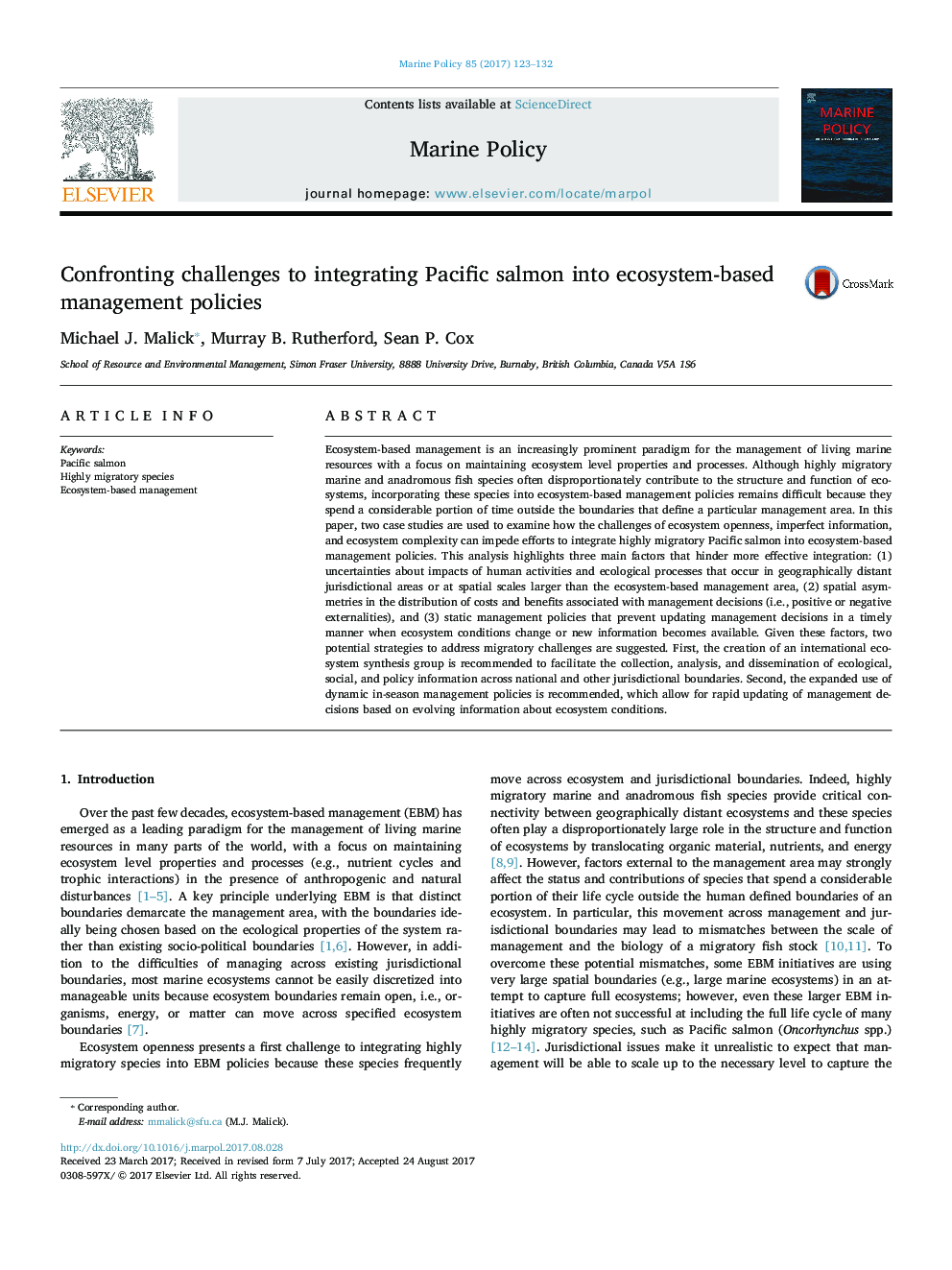| کد مقاله | کد نشریه | سال انتشار | مقاله انگلیسی | نسخه تمام متن |
|---|---|---|---|---|
| 5118325 | 1485494 | 2017 | 10 صفحه PDF | دانلود رایگان |
عنوان انگلیسی مقاله ISI
Confronting challenges to integrating Pacific salmon into ecosystem-based management policies
ترجمه فارسی عنوان
مقابله با چالش ها برای ادغام ماهی قزل آلا اقیانوس آرام به سیاست های مدیریت اکوسیستم
دانلود مقاله + سفارش ترجمه
دانلود مقاله ISI انگلیسی
رایگان برای ایرانیان
کلمات کلیدی
ترجمه چکیده
مدیریت مبتنی بر اکوسیستم، یک پارادایم به طور فزاینده ای برجسته برای مدیریت منابع دریایی زنده با تمرکز بر حفظ خواص و فرآیندهای سطح اکوسیستم است. گرچه گونه های ماهی دریایی و آنادروم بسیار مهاجر اغلب به ساختار و عملکرد اکوسیستم ها کمک فراوانی می کنند، این گونه ها را به سیاست های مدیریت اکوسیستم محدود می کند، چرا که آنها بخش قابل توجهی از زمان را صرف امور خارج از مرزها می کنند که یک منطقه مدیریت خاص را تعریف می کنند. در این مقاله، دو مورد مورد استفاده برای بررسی چگونگی چالش های باز بودن اکوسیستم، اطلاعات ناقص و پیچیدگی اکوسیستم می تواند مانع تلاش برای ادغام ماهی قزل آلا مهاجران اقیانوس آرام در سیاست های مدیریت اکوسیستم شود. این تحلیلی، سه عامل اصلی را که مانع ادغام مؤثرتر می شود، نشان می دهد: (1) عدم اطمینان در مورد تأثیرات فعالیت های انسانی و فرایندهای زیست محیطی که در مناطق جغرافیایی در حوزه های حوزه قضایی و یا در مقیاس های فضایی بزرگتر از منطقۀ مدیریت اکوسیستم رخ می دهد، (2) عدم تقارن فضایی در توزیع هزینه ها و منافع مربوط به تصمیمات مدیریتی (مثلا منافع مثبت یا منفی) و (3) سیاست های مدیریت استاتیک که مانع از اتخاذ تصمیمات مدیریتی در موقع تغییر شرایط اکوسیستم و یا دسترسی به اطلاعات جدید می شود. با توجه به این عوامل، دو راهبرد بالقوه برای رسیدگی به چالش های مهاجرتی پیشنهاد شده است. اولا ایجاد یک گروه سنتز بین المللی اکوسیستم برای تسهیل جمع آوری، تجزیه و تحلیل و انتشار اطلاعات زیست محیطی، اجتماعی و سیاستی در مرزهای ملی و سایر حوزه های قضایی توصیه می شود. دوم، استفاده گسترده از سیاست های مدیریت پویای در فصل توصیه می شود، که به منظور به روز رسانی سریع تصمیمات مدیریت بر اساس اطلاعات تکاملی در مورد شرایط اکوسیستم اجازه می دهد.
موضوعات مرتبط
مهندسی و علوم پایه
سایر رشته های مهندسی
مهندسی دریا (اقیانوس)
چکیده انگلیسی
Ecosystem-based management is an increasingly prominent paradigm for the management of living marine resources with a focus on maintaining ecosystem level properties and processes. Although highly migratory marine and anadromous fish species often disproportionately contribute to the structure and function of ecosystems, incorporating these species into ecosystem-based management policies remains difficult because they spend a considerable portion of time outside the boundaries that define a particular management area. In this paper, two case studies are used to examine how the challenges of ecosystem openness, imperfect information, and ecosystem complexity can impede efforts to integrate highly migratory Pacific salmon into ecosystem-based management policies. This analysis highlights three main factors that hinder more effective integration: (1) uncertainties about impacts of human activities and ecological processes that occur in geographically distant jurisdictional areas or at spatial scales larger than the ecosystem-based management area, (2) spatial asymmetries in the distribution of costs and benefits associated with management decisions (i.e., positive or negative externalities), and (3) static management policies that prevent updating management decisions in a timely manner when ecosystem conditions change or new information becomes available. Given these factors, two potential strategies to address migratory challenges are suggested. First, the creation of an international ecosystem synthesis group is recommended to facilitate the collection, analysis, and dissemination of ecological, social, and policy information across national and other jurisdictional boundaries. Second, the expanded use of dynamic in-season management policies is recommended, which allow for rapid updating of management decisions based on evolving information about ecosystem conditions.
ناشر
Database: Elsevier - ScienceDirect (ساینس دایرکت)
Journal: Marine Policy - Volume 85, November 2017, Pages 123-132
Journal: Marine Policy - Volume 85, November 2017, Pages 123-132
نویسندگان
Michael J. Malick, Murray B. Rutherford, Sean P. Cox,
